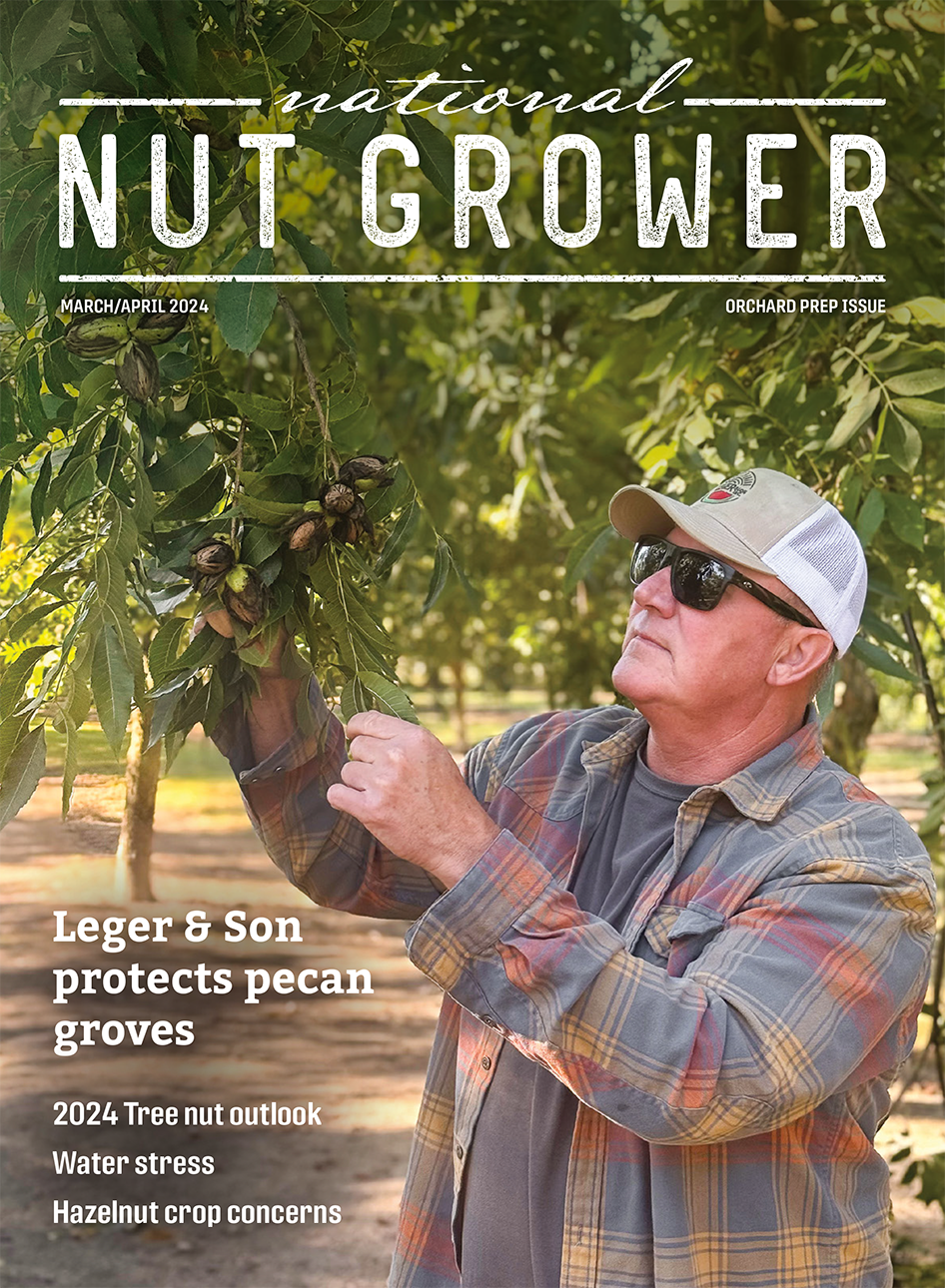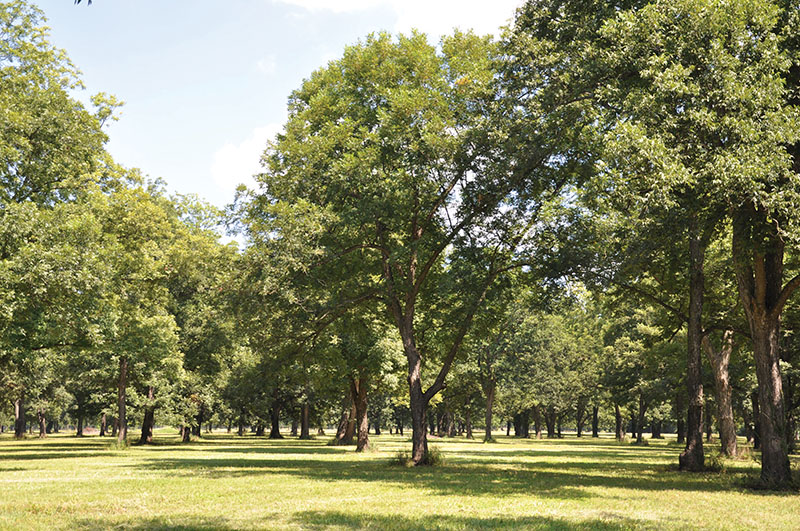
Mar/Apr 2022
From planting to packaging
From the orchard to the retail shelf, to mulch and the landscaping of garden walkways, Miller Pecan Co. is involved all the way. It’s one of the few pecan producers in the country that sees the nuts through the entire process – planting, grafting, harvesting, cleaning, shelling, packaging, marketing and sales.
Brothers Justin and Jared Miller have been growing and harvesting pecans since the mid-80s and now spearhead the Miller Pecan operation, located in Northeast Oklahoma on river bottom land along the Neosho River. Straddling state borders, the family grew in Northeast Oklahoma and, in 2000, built a custom cleaning barn in Kansas, which allowed them to clean for neighboring growers.
After consolidating to Miller Pecan’s current location, the brothers opened a processing facility in 2014, growing the business their father Len started and becoming fully integrated after roughly three decades in the field. They currently only harvest what they own, and have harvested as much as 1,500 acres, with about half that in production right now and another 250 acres planted ranging from 1-15 years.
With some of the 15-year trees getting close, the majority of that block is still 5-15 years away from production. When everything is planted and ready, the Oklahoma-based operation will have 1,100 acres in production.
Processing, however, is a different story, with pecans being sourced not only locally from neighboring farms, but also from a few other states, including Oklahoma’s bordering states of Kansas (which is a mere 10 minutes away) and Texas, as well as the nation’s top pecan producer, Georgia. This year, the operation expects to process at least 2,000-2,500 tons of pecans, with additional tons dependent on how the nation continues to be affected by the coronavirus pandemic and supply chain interruptions.
“A lot depends on the world we live in now with COVID, so we have to be careful with inventory, the stuff we’re buying and everything,” said Jared Miller, co-owner of Miller Pecan.
Smart decisions recognized
While the Miller brothers can easily fill in for each other, they each focus on their particular strengths within the operation. Justin ensures the smooth operation of the processing plant and emphasizes food safety and quality assurance. Jared manages the business operations of buying, selling, marketing and customer care. This has yielded great results for the duo.
Together and continuing the family legacy, they have led Miller Pecan to become the largest pecan sheller in Oklahoma, and in 2017, Miller Pecan won the Oklahoma Pecan Grower of the Year award, which is presented by the Oklahoma Pecan Grower’s Association and chosen by local pecan growers to be given to one farm family.
“That year, we had a phenomenal crop,” said Miller, “and the committee (in charge of the award) knew we had raised a large, good quality crop.”
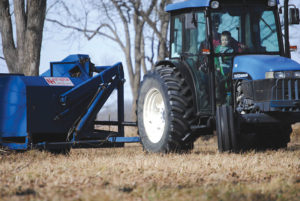
While the committee doesn’t delve into a farm’s particular usage numbers or products, it isn’t unfamiliar with the growers it’s considering. Regular spray programs, fertilization and irrigation are all taken into account.
“Though, right here in our local area, we have more of a drainage issue. More than trying to get water to our trees, we’re trying to get water away from our trees,” said Miller.
2019 was a year of floods for the operation, with Miller estimating the occurrence happening about 20 times. With many of those floods, the water would be 12-15 feet deep around the trees, he said. While long-term flooding can be detrimental to the trees, Miller noted that flooding can be beneficial to the field.
“The trees are pretty resilient. If a flood comes up and goes down over five to seven days, it actually brings in a lot of nutrients and is good when the ground is completely saturated,” he said.
“If they stand under water for 30 to 40 days, it’s going to stress them; they might abort the crop or might not set a good crop the following year. If a tree stands underwater for more than about 120 days, you’ll start having tree death.”
The longest flood Miller Pecan has experienced lasted about 21-22 days.
Sterilization and drying
There are a few different options for sterilizing, including a chlorine bath, steam or immersion in hot water. Miller Pecan opts for the hot water method of sterilization.
“Chlorine works great, but you have to be able to prove that your chlorine levels never drop below 200 parts per million. And, it’s just hard, because you’re always monitoring, always adding,” Miller said.
The hot water, on the other hand, involves a thermometer with a digital readout, and once the water is hot enough, the nuts are dipped into the bath and brought out after a certain length of time. From there, it’s the usual journey through all the processing machinery – moving through the cracker, where the nuts are cracked individually, then through the sheller and various blowers before ending up at sizing. A final pass through infrared tech eliminates remaining shell pieces. Once they’re dried down to moisture for packing, they get inspected by the human eye and placed into a box.
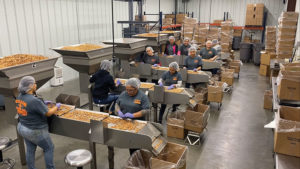
Industry standard moisture levels are under 5%, with University of Georgia Extension recommending 4.5%.
“We do not want mold in a box,” Miller stressed, but also noted that beyond mold prevention, nothing much happens if nuts are dried just a little further.
Miller Pecan’s policy is for a 3.5-4% moisture level for packing. A little less than that and it becomes an issue not necessarily of quality, but of weight loss. (Too far, however, could damage the kernel’s color, quality and flavor, but also reduces too much weight.)
“When you crack 2 million pounds of kernel, two percent is quite a bit of weight. So, you’re kind of shooting yourself in the foot,” he said.
While every area in the U.S. is a little different due to conditions, nine times out of 10, said Miller, the farm’s pecans are dry enough when they come out of the field. In exceptionally wet years, they’ll have to put air on them to get them dried down. This is very different from other areas that pick early to catch the gift pack market, during which the nuts are picked while still green, need dehusking, and need air to get dried down.
And this is one of the biggest points Miller can make to growers who are preparing their crops for the processor – keep them dry.
“A lot of what we see is grower’s picking pecans when they’re too wet, and these growers aren’t equipped to get them dried down,” said Miller. “If you have too much moisture in that kernel, and it’s sitting in a barn somewhere, it can sprout or get embryo rot.”
Debris is less of a concern, as Miller has seen that most growers do a good job of cleaning before they get to the facility.
“If you definitely want to get the top bid for your pecans, you want to get known for doing a really good job cleaning them,” Miller said.
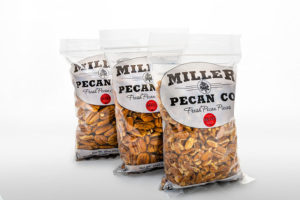
Byproducts and retail
The trend of using tree nut byproducts is growing, and Miller’s pecan shells are finding their use in other industries. Aside from being used to cover walkways and as mulch (evergreens and azaleas love the nitrogen), the shells have also been used in oil fracking, sandblasting and meat smoking, with another endeavor in the works for use in the beer industry.
Miller Pecan also has an affinity for retail – the shelling facility has a retail storefront complete with an assortment of goodies. It also appreciates the longevity of high quality pecans and tries to emphasize proper storage for both growers and retail customers alike. And while the company packages and sells its own pecans, it will also buy back the pecans sold to candymakers or will have the nuts custom coated. Their selection is broad – from in-shell or raw, to pecan oil, to flavors like chipotle cheddar, cinnamon spice or chocolate praline coated.
As for future plans, Miller Pecan will continue planting its acres and growing its online wholesale and retail business. Customers include name brand food companies for whom they pack, the locals on the search for a nice gift, and out-of-state shoppers looking for a tasty, quality snack.







